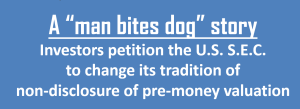
The U.S. Securities and Exchange Commission can help investors protect themselves from overpriced stock deals if it requires valuation disclosure in offering documents.
Briefly, valuation is the presumed price to buy a company, based on its stock price. When new shares are sold, savvy investors focus on the “pre-money valuation,” which is the number of shares outstanding before the offering times the price of a new share. The number is important because the buy in valuation is a key determinant of an investor’s eventual return.
Whether privately held or publicly traded, a company’s valuation should approximate what it might be acquired for. Often, it doesn’t, especially if it is a venture-stage company. Such a business is often unprofitable, has questionable prospects and will need capital from future investors to operate. A venture-stage company is difficult to value reliably.
Assume a scenario where such an enterprise, ABC Company, is raising capital at a $50 million pre-money valuation. How might an investor evaluate an investment? If she knows the valuation, she is likely to pose a question like this one.
ABC Company has modest revenue and no profit, so why should I invest when it is valued at $50 million?
If the investor does not know the valuation, she might instead ask, “Why should I invest at $X per share?” But this is not meaningful. Many combinations of share prices and shares outstanding can result in the same valuation. Both numbers are used to calculate a valuation, just as two hands are used to make a clap.
The key question is “Why is ABC Company worth $50 million?” and investors who fail to ask it are more likely to make a poor decision, even when they are right about the company’s ability to achieve its potential. That’s because one can overpay for a position in a successful company.
Valuation is a vital data point and investors should not, as they do now, have the burden of calculating it. Many do not know how to. Others may be uncomfortable doing so or forget to. Some may calculate it incorrectly. But if the amount is declared in an offering document, anyone can see what it is.
But the SEC does not require valuation disclosure. It assumes that investors can and will calculate it themselves. This is remarkable, given how important the figure is and how likely it is that an investor will fail to correctly calculate it. It is also odd, when one considers how many pages of an offering document are devoted to risk factors while a valuation can be expressed in a single sentence.
Venture capital and private equity firms absolutely know the valuation of companies they invest in. They also have insight on comparable valuations via their network and fee-based research services that rely on voluntary disclosure from private companies. Angel investors tend to know a company’s valuation but have less market insight than VC and PE firms. In stark contrast, only a small fraction of a company’s public investors is likely to know it’s valuation and few of them will know how it compares. This is not the hallmark of a healthy, open market.
The beneficiaries of a valuation disclosure requirement will be numerous. That’s because data aggregation services can be counted on to harvest data points about private and public offerings from the regulatory database and use it to create rich content. For example, valuations could be associated with the amount raised and when, with an issuer’s industry, location, financial data and other factors. Such insight can enhance capital markets in ways that Zillow and Trulia benefit the real estate market.
Together, an issuer’s valuation disclosure and access to robust market data will position any investor, not just the professional ones, to ask questions such as these.









Leave A Comment